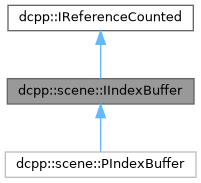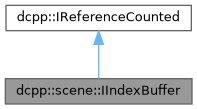 |
Duckcpp 2.1.0
Duckcpp is a high-performance c++ graphics engine.
|
 |
Duckcpp 2.1.0
Duckcpp is a high-performance c++ graphics engine.
|


Public Member Functions | |
| virtual void * | getData ()=0 |
| Pointer to first element. | |
| virtual const void * | getData () const =0 |
| Const pointer to first element. | |
| void * | pointer () |
| Same as getData(), just closer to dcpp::nub::array interface. | |
| virtual dcpp::video::E_INDEX_TYPE | getType () const =0 |
| virtual void | setType (dcpp::video::E_INDEX_TYPE IndexType)=0 |
| Change between 16 and 32 bit indices. | |
| virtual dcpp::uint32_kt | stride () const =0 |
| Number of bytes per element. | |
| virtual dcpp::uint32_kt | size () const =0 |
| Number of elements. | |
| virtual void | push_back (dcpp::uint32_kt value)=0 |
| Add value to end. Note that for 16 bit index types values shouldn't be larger than dcpp::uint16_kt. | |
| virtual void | setValue (dcpp::uint32_kt index, dcpp::uint32_kt value)=0 |
| Set value at index. Note that for 16 bit index types values shouldn't be larger than dcpp::uint16_kt. | |
| virtual dcpp::uint32_kt | operator[] (dcpp::uint32_kt index) const =0 |
| Access element value at given index. | |
| virtual dcpp::uint32_kt | getLast ()=0 |
| virtual void | set_used (dcpp::uint32_kt usedNow)=0 |
| virtual void | reallocate (dcpp::uint32_kt new_size, bool canShrink=true)=0 |
| virtual dcpp::uint32_kt | allocated_size () const =0 |
| virtual E_HARDWARE_MAPPING | getHardwareMappingHint () const =0 |
| get the current hardware mapping hint | |
| virtual void | setHardwareMappingHint (E_HARDWARE_MAPPING NewMappingHint)=0 |
| set the hardware mapping hint, for driver | |
| virtual void | setDirty ()=0 |
| flags the meshbuffer as changed, reloads hardware buffers | |
| virtual dcpp::uint32_kt | getChangedID () const =0 |
| Get the currently used ID for identification of changes. | |
 Public Member Functions inherited from dcpp::IReferenceCounted Public Member Functions inherited from dcpp::IReferenceCounted | |
| IReferenceCounted () | |
| Constructor. | |
| virtual | ~IReferenceCounted () |
| Destructor. | |
| void | grab () const |
| Grabs the object. Increments the reference counter by one. | |
| bool | drop () const |
| Drops the object. Decrements the reference counter by one. | |
| dcpp::int32_kt | getReferenceCount () const |
| Get the reference count. | |
| const dcpp::char_kt * | getDebugName () const |
| Returns the debug name of the object. | |
Additional Inherited Members | |
 Protected Member Functions inherited from dcpp::IReferenceCounted Protected Member Functions inherited from dcpp::IReferenceCounted | |
| void | setDebugName (const dcpp::char_kt *newName) |
| Sets the debug name of the object. | |
|
pure virtual |
Get the currently used ID for identification of changes.
This shouldn't be used for anything outside the VideoDriver.
Implemented in dcpp::scene::PIndexBuffer.
|
pure virtual |
Const pointer to first element.
Implemented in dcpp::scene::PIndexBuffer.
|
pure virtual |
Pointer to first element.
Implemented in dcpp::scene::PIndexBuffer.
|
pure virtual |
get the current hardware mapping hint
Implemented in dcpp::scene::PIndexBuffer.
|
pure virtual |
Access element value at given index.
Implemented in dcpp::scene::PIndexBuffer.
|
pure virtual |
Add value to end. Note that for 16 bit index types values shouldn't be larger than dcpp::uint16_kt.
Implemented in dcpp::scene::PIndexBuffer.
|
pure virtual |
flags the meshbuffer as changed, reloads hardware buffers
Implemented in dcpp::scene::PIndexBuffer.
|
pure virtual |
set the hardware mapping hint, for driver
Implemented in dcpp::scene::PIndexBuffer.
|
pure virtual |
Change between 16 and 32 bit indices.
This copies all indices to a new buffer of corresponding type. Be careful - going from 32 to 16 bit will only work correctly if none of your indices is larger than 16 bit.
Implemented in dcpp::scene::PIndexBuffer.
|
pure virtual |
Set value at index. Note that for 16 bit index types values shouldn't be larger than dcpp::uint16_kt.
Buffer must be already large enough. This is basically the non const version of operator []
Implemented in dcpp::scene::PIndexBuffer.
|
pure virtual |
Number of elements.
Implemented in dcpp::scene::PIndexBuffer.
|
pure virtual |
Number of bytes per element.
Implemented in dcpp::scene::PIndexBuffer.